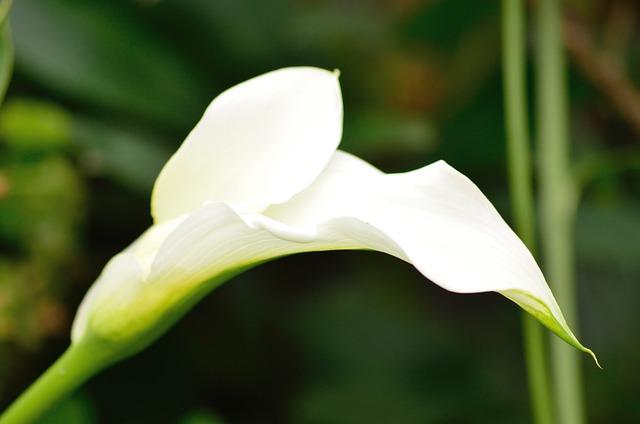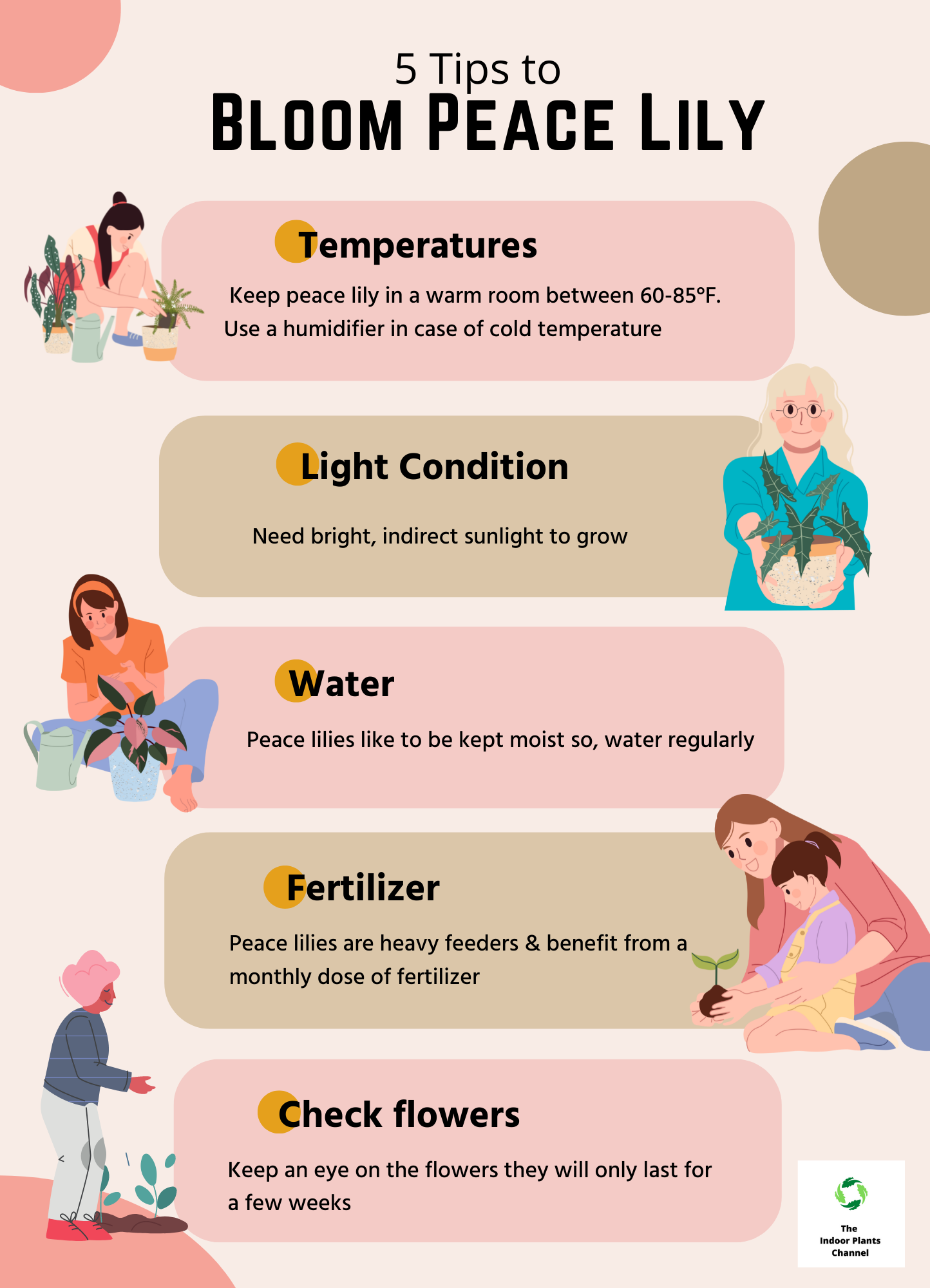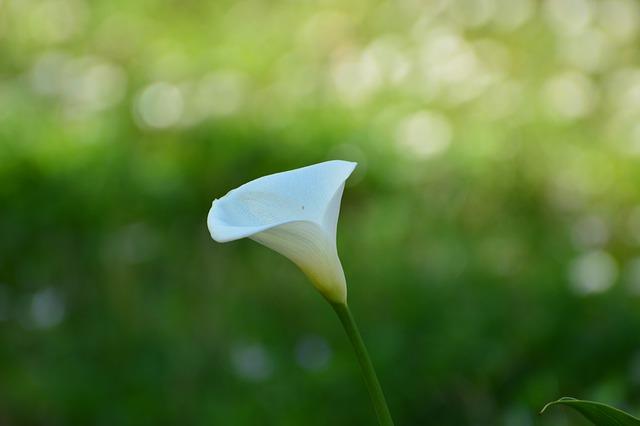A peace lily blooming is a beautiful sight. The plant is native to tropical regions of Asia and is typically found in rainforests. The peace lily has long been a symbol of purity and innocence.
“The flower that blooms in adversity is the most rare and beautiful of all.”

If you are thinking about getting a peace lily, this post will guide you on how to care for it. A peace lily blooming is a beautiful addition to any home.
How To Get Your Peace Lily To Bloom
If you want your peace lily to bloom, there are a few things you can do to encourage it.
- Make sure you are providing the plant with enough light. It should be in a spot where it gets bright, indirect sunlight. If it’s not getting enough light, it won’t bloom.
- Peace lilies like to be slightly pot-bound, so don’t re-pot it too often. Every two or three years is usually sufficient. When you do re-pot, use a pot that is only slightly larger than the one it’s currently in.
- Water the plant properly. Peace lilies like to have moist soil, but they don’t like to be waterlogged. Allow the top inch or two of soil to dry out before you water again.
- Fertilize your peace lily every month or two during the growing season. Use a general purpose fertilizer that is diluted to half the strength recommended on the package.
- Peace lilies benefit from being misted with water occasionally. This helps to increase the humidity around the plant, which it likes.
By following these tips, you should be able to get your peace lily to bloom.
When To Expect Peace Lily To Bloom
As soon as you bring your peace lily home, it’s time to start thinking about blooming. While peace lilies can bloom at any time of year, they typically bloom in the late spring or early summer.
To encourage blooming, try to mimic the conditions that Peace lilies experience in their natural habitat. They are native to the tropical rainforests of South America, so they thrive in warm, humid environments.
Here are a few tips to help you get your peace lily to bloom:

- Keep your peace lily in a warm room. Peace lilies do best in temperatures between 60 and 85 degrees Fahrenheit. If your home is on the cooler side, you can use a humidifier to raise the humidity around your peace lily.
- Give your peace lily bright, indirect sunlight. Peace lilies will tolerate low light conditions, but they will bloom best if they receive bright, indirect light. Avoid placing your peace lily in direct sunlight, as this can scorch the leaves.
- Water your peace lily regularly. Peace lilies like to be kept moist, but they don’t like to sit in water. Be sure to empty any water that collects in the saucer under your peace lily pot.
- Feed your peace lily every other month. Peace lilies are heavy feeders and will benefit from a monthly dose of fertilizer. However, be sure to use a fertilizer that is specifically designed for flowering plants.
- Keep an eye on the flowers. Once the peace lily flowers begin to bloom, they will only last for a few weeks. However, you can extend the blooming period by deadheading the flowers. To deadhead a flower, simply snip off the flower stalk at the base, just above the leaves.
How To Encourage Peace Lily To Bloom

If you want to encourage your peace lily to bloom, here are five quick tips:
- Provide plenty of bright, indirect light.
- Keep the soil moist, but not soggy.
- Apply a balanced fertilizer once a month during the growing season.
- Allow the plant to go through a period of dormancy in the fall and winter.
- Propagate peace lilies by dividing the root ball.
Frequently Asked Questions
How often should I water my peace lily?
Generally, you should water your peace lily once a week. However, you may need to water more frequently if the plant is placed in a dry or sunny location.
What type of soil is best for a peace lily?
Peace lilies prefer a rich, well-drained soil. You can use a potting mix designed for indoor plants, or you can make your own by mixing equal parts peat moss, perlite, and vermiculite.
How much light does a peace lily need?
Peace lilies do best in indirect light. If the leaves begin to turn yellow, this is a sign that the plant is getting too much light.
What are the best temperatures for a peace lily?
Peace lilies prefer warm temperatures between 60 and 85 degrees Fahrenheit. They will tolerate lower temperatures, but growth may be slower.
What are the best ways to fertilize a peace lily?
Peace lilies can be fertilized with a general-purpose fertilizer for indoor plants. However, it is best to use a fertilizer that is lower in nitrogen and higher in phosphorus. This will help to encourage blooming.
Conclusion
If you’re looking for a beautiful and easy-to-care-for houseplant, the peace lily is a great choice. The plant has deep meanings behind its existence and is quite beautiful. Also, Peace Lilies blooming is a cycle you should be familiar with as an owner. Hence, we’ve highlighted all you should know about this growth of Peace Lilies and how you should induce it.
Michelle Wilde
Related posts
3 Comments
Leave a Reply Cancel reply
![]()
About Michelle Wilde
Michelle Wilde is a stay-at-home mom and avid plant lover. Armed with a post-graduate degree in Computer Science (no kidding!), she loves researching plants and landscapes. When she is not caring for her 4 kids, she spends time on her passion for plants. She blogs at www.indoorplantschannel.com, the trusted source for indoor plants.
Learn more
Subscribe
* You will receive the latest posts and updates about indoor plants!
Search
Recent Posts
Categories
- Beginner Guides (10)
- FAQ (206)
- General (2)
- How-To Guides (212)
- Indoor Plants (214)
- Pest Management (2)
- Plant Problem Solutions (4)
- Seasonal Growing (2)
- Specialized Environments (2)
- Specific Plant Care (3)
- Technical Growing (2)
[…] Peace lilies are a type of flowering plant that is known for its ability to filter out harmful toxins from the air. Like snake plants and spider plants, they can help improve air quality and reduce stress and anxiety. […]
[…] Peace lilies are a type of flowering plant that is known for their ability to purify the air. They are also known to be effective at reducing stress and anxiety. […]
[…] is a great choice. The indoor plant is pretty and has various benefits. Similarly, one of the best ways to package your Peace Lily is to put it in an elegant planter. We’ve highlighted some of the factors you should consider […]